JBreak Java Conference: The Conquest of Siberia
In Moscow and St. Petersburg, a large Java conference doesn’t surprise anyone: JPoint and Joker regularly gather a lot of viewers and invite famous speakers. But now JUG.ru has struck at Novosibirsk as well, having spent there a JBreak (or, stylizedly, jbreak; ).
This decisive breakthrough raises many questions. Did you get the audience together? Did you manage to create an interesting program, or do not call anyone from bright speakers to Siberia? And the most curious thing: was there something at the Siberian conference that is not in Moscow and St. Petersburg?
All answers - in the detailed text under the cut.
')
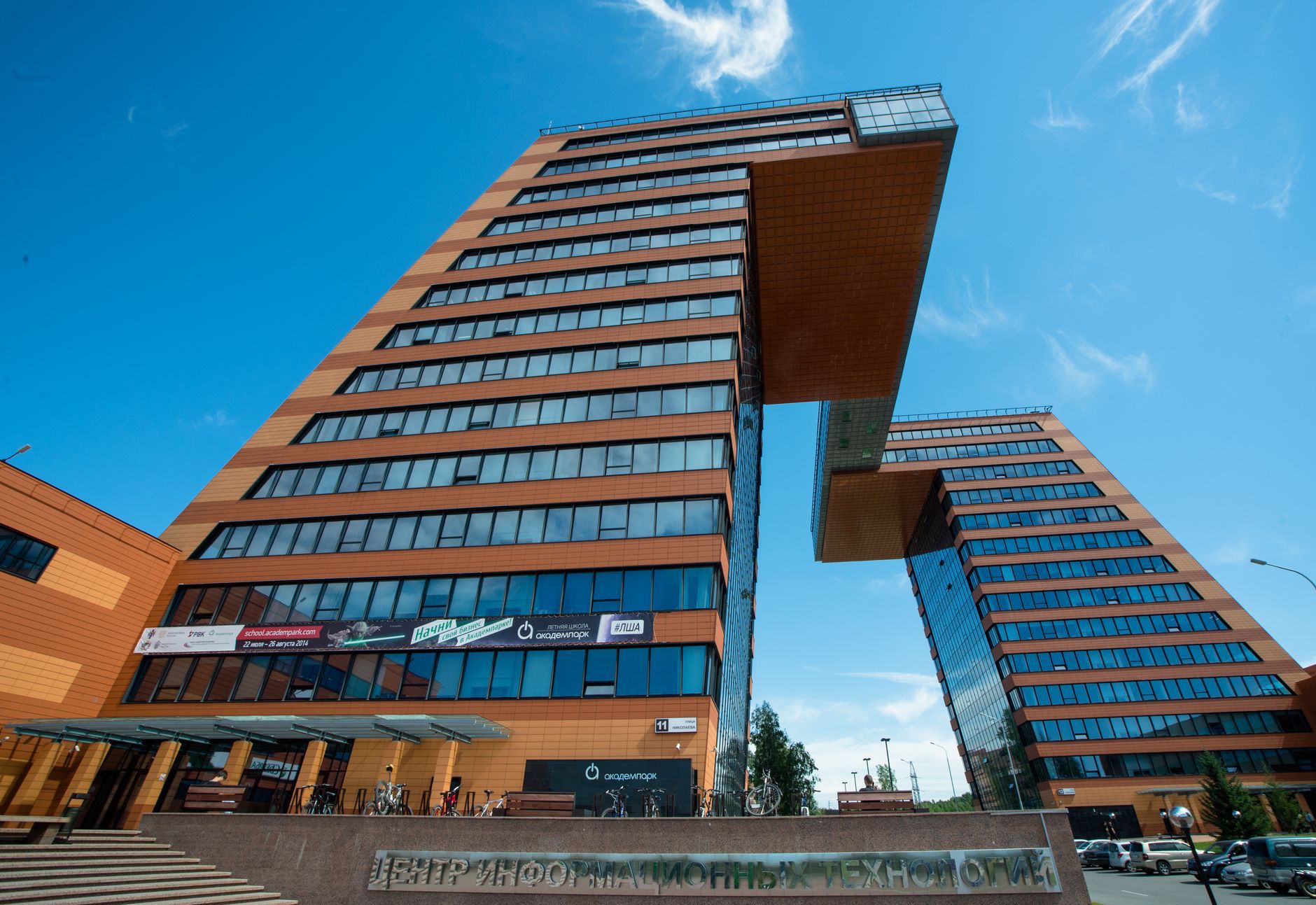
In Novosibirsk, even the conference venue itself is reminiscent of information technologies: the event was held at the Technopark of the Novosibirsk Academgorodok. The building of two connected “towers”, which appeared in 2012, immediately became one of the most recognizable objects of the Academgorodok (perhaps even more recognizable than the monument “Mouse knitting DNA”) - therefore use conference rooms located in one of the towers , downright obvious.
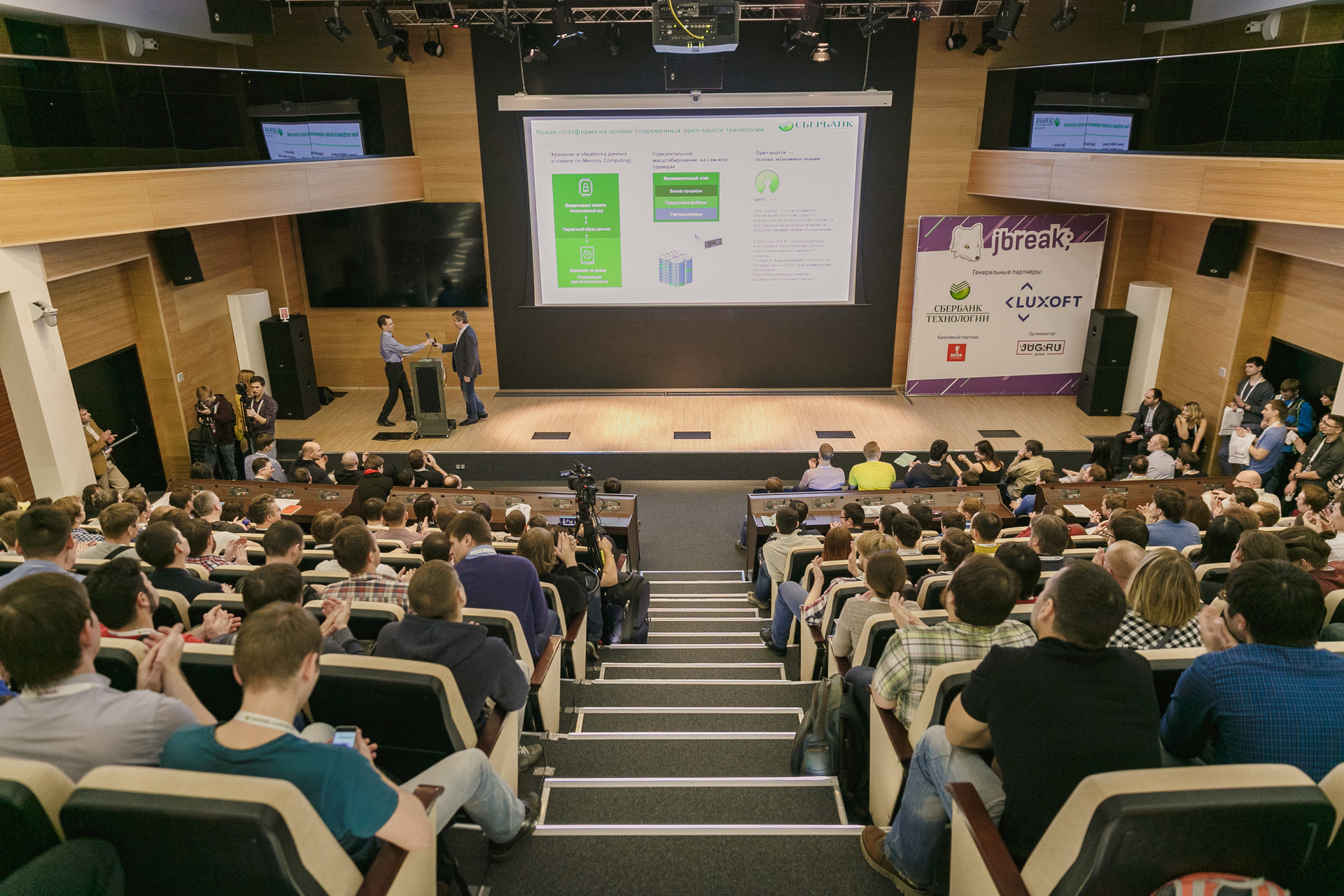
However, already during the opening an important restriction of the site became noticeable. If we count both spectators, speakers, and organizers, the conference brought together 400 people - and rested against the ceiling of capacity. Any possible anxiety "but suddenly no one will come" turned out to be clearly in vain. On the badges of the participants it was possible to see the names of not only Novosibirsk companies (Excelsior, LEDAS), but also, for example, Tomsk Siberteam - so the conference was not limited to one city, but brought together experts from the entire region.
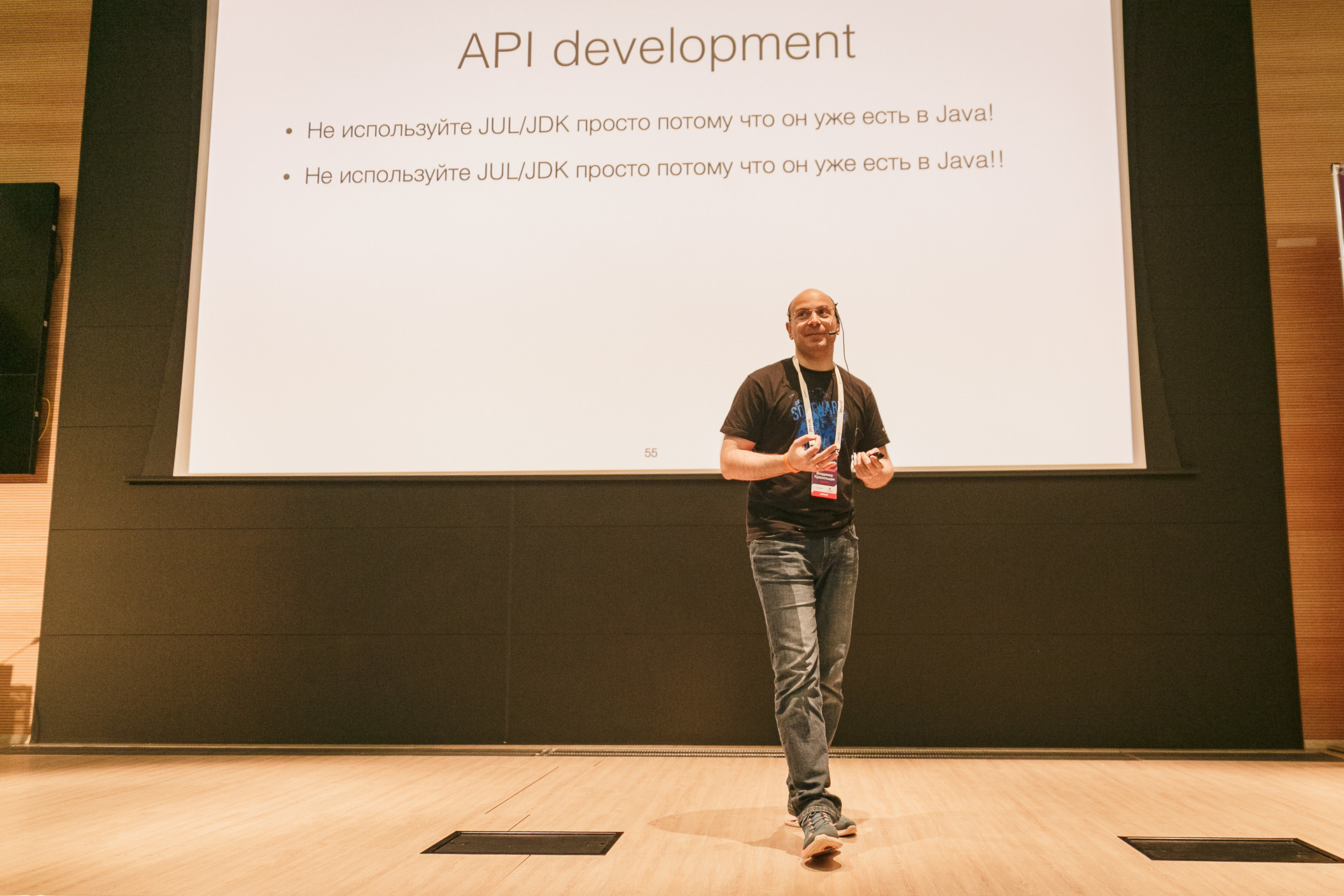
After the opening, the reports began in three halls. Vladimir Krasilshchik (Luxoft) was the first to take the main stage with a speech about useful conclusions made by him when changing the logging system in the project. Here I would like to recall that the popular old Habrapost about logging in Java is equipped with the subtitle "Nightmare Story": the zoo of the relevant products, allowing for the "wrapper around the wrapper" situation, cannot be dealt with. On the one hand, this means that such reports are useful (there are many nuances that you should pay attention to), but on the other hand, that the only correct approach to logging does not exist, and you have to choose which services to use exactly anyway. Dyer himself, answering the question “why did you choose SLF4J + logback,” simply demonstrated their logos: these two products were already developed with the idea that they would be used together.

In the third hall, in the meantime, a Luxoft employee also spoke, but from Poland - Michal Kordas . And after that, the second hall was taken by Aleksey Shipilev (Oracle) , who didn’t need any introduction to the Russian Java community. That is, the geographical location of the conference did not prevent to attract neither a foreign specialist, nor a star of Russian Java conferences.
Sberbank-Technologies for a long time occupied the third hall with a series of mini-reports on the new Sberbank platform. The very fact that a rather closed large organization suddenly decided to show “what is under the hood”, as one of its speakers commented, “we ourselves are in shock” is interesting here. It seems that times are changing: first, German Gref directly acknowledged the shortcomings of the current IT situation in Sberbank and linked his future with “technologies of a Russian-American company”, and now the bank has allocated an entire troop of speakers for a detailed story about this future. Separately, it is curious that this happened at the Novosibirsk conference, and Siberians received reports that Muscovites did not hear (in Moscow there was already a conference "Front Front System" , but with a completely different composition of speakers).
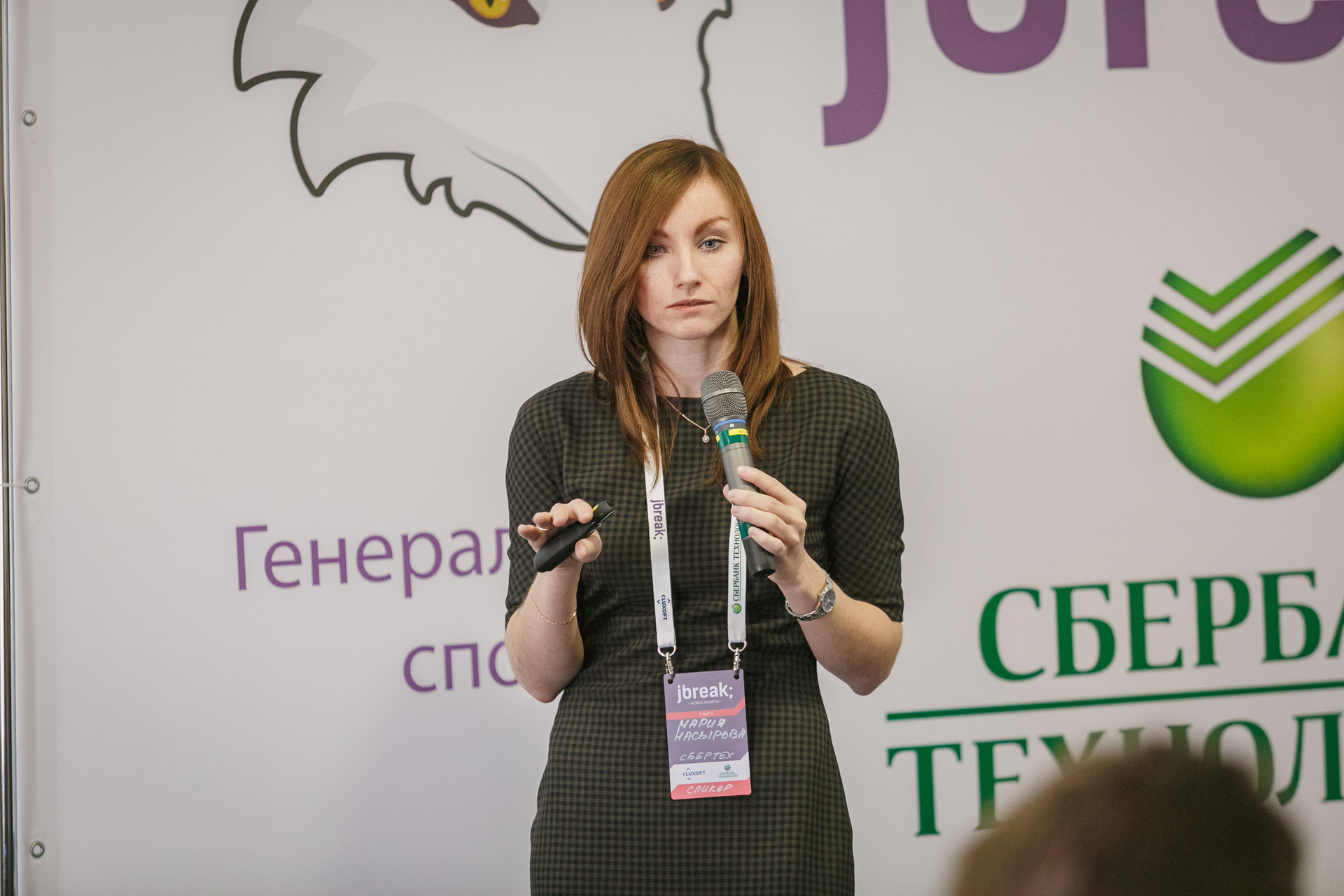
In the speeches of Sbertech, the company Gref referred to was repeatedly mentioned: this is GridGain, in which Sberbank recently acquired a share. She is engaged in the In-Memory Data Grid, and the bank decided to follow this path, keeping all possible data in RAM and using non-volatile data for archiving only. Sberbank is not the only bank that has taken such a course, but the largest one, and even basic numbers are impressive in its case (5 petabytes of archives, 500 million daily transactions - while transactions account for only 10% of system calls, most of the requests are informational) .

In the report on load testing, Sbertech speakers, illustrating their thesis “you should start it as soon as possible,” mentioned a touching detail: when working on a new Sberbank platform it was worth doing such testing, and there was not enough equipment for this , temporarily used computers of employees who went on vacation. The fact that they told this also shows that the bank was more open than one would expect - and as a result, the audience actively asked questions to the speakers even when the lunch time began. If people are ready to postpone food in order to find out something, this is probably the most graphic evidence that they found it interesting.
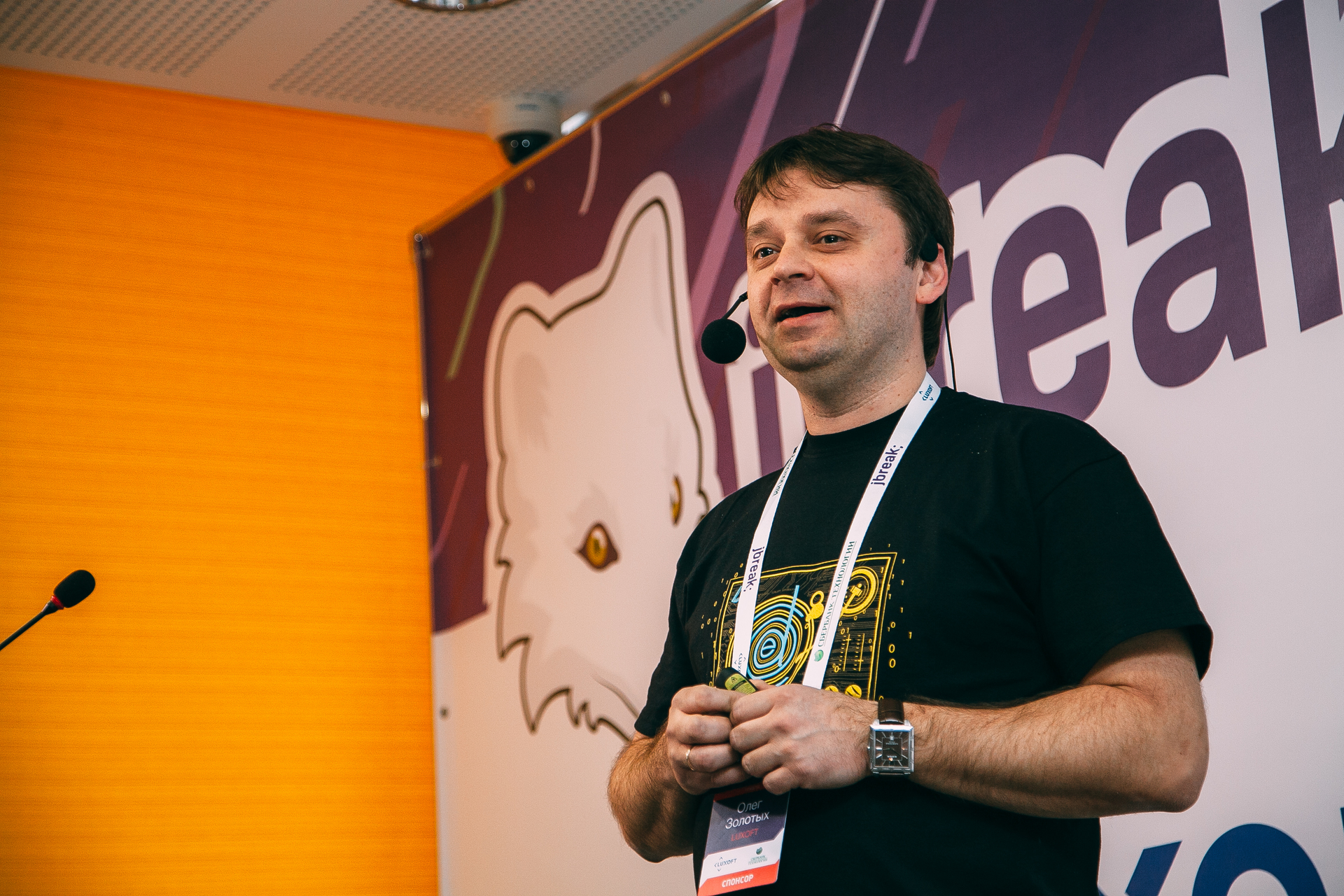
Immediately after lunch, it is difficult to dive into the technological jungle - so the presentation by Oleg Zolotye , Managing Director of Luxoft Russia , dedicated not to technical issues, but to the specifics of working in Luxoft, helped calmly digest both information and food. Meanwhile, in another room, Nikita Lipsky (Excelsior) , who has been working on Excelsior JET for many years, talked about how Java 8 features are implemented in it. Although Lipsky can be seen at Moscow and St. Petersburg conferences, he spoke here in his native land. Since Excelsior JET is used all over the world, it is easy to lose sight of the fact that this is a Novosibirsk project - but the report reminded you of this by putting the city on the map of the Java world.

But the most interesting of the local began after that. Novosibirsk Artemyev and Sergey Andreenko from UniPro at the Moscow conferences was not to be seen - and if JBreak had not passed in their city, who knows if they would have presented their work somewhere in public. At the same time, they have a unique experience in implementing Java on the Russian Elbrus processor (commissioned by the MCST: UniPro has many years of experience working with Sun, so it’s not surprising that they make Java for Elbrus).
It was obvious: what was told here, in Moscow, was not heard, and did not google on the Internet. As a result, in the third hall, not only were all the seats filled, but there were enough standing spectators, and everything was very lively: although questions are usually asked after the report, many here were not kept and asked right away.
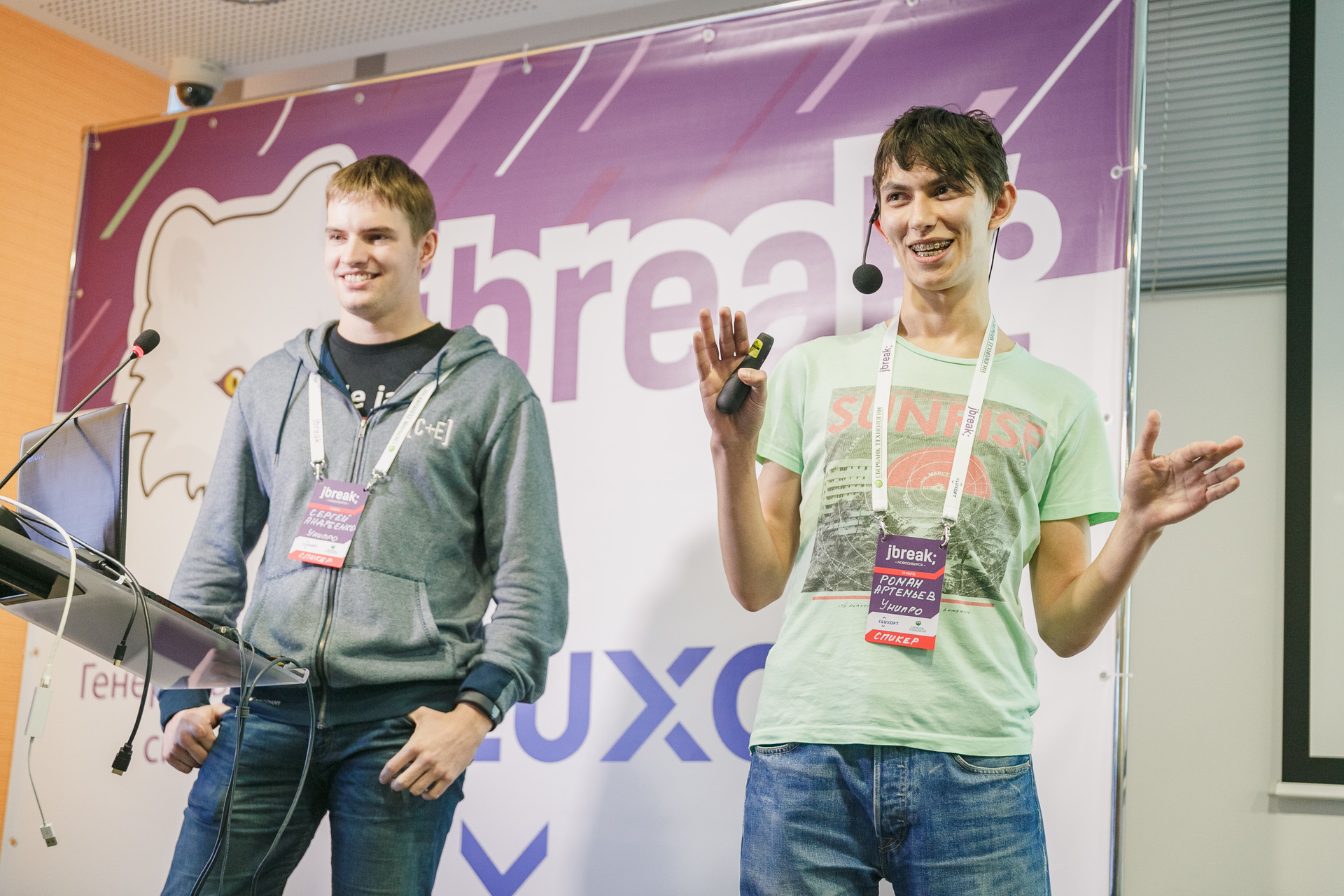
Even before it turned out that something was said about Java, the conversation began with the details of the Elbrus architecture - so that low-level fans got on the move with their portion of hardcore. The speakers then proceeded to how architectural features affect the use of Java (“yes, exceptions should be thrown away less often”) and how they optimized, and at the end shared their results of comparing Java performance on Elbrus and on Intel Core 2 Quad Q9300. While Intel predictably turned out to be faster, in terms of “performance per gigahertz,” it turned out to be a parity that impressed even experts from Excelsior, Oracle and SAP, who were sitting in the hall. Not so long ago in the text on GeekTimes about the performance of Elbrus, the situation with Java turned out to be much sadder, that is, optimization right before our eyes brings great results.
When the report ended the same, the organizers immediately had to say “let's confine ourselves to a couple of questions, and the rest can be answered on the sidelines”: it was obvious that otherwise the time limit would not be met. As a result, Roman and Sergey moved to the hall, where they continued to speak enthusiastically with the people around them.
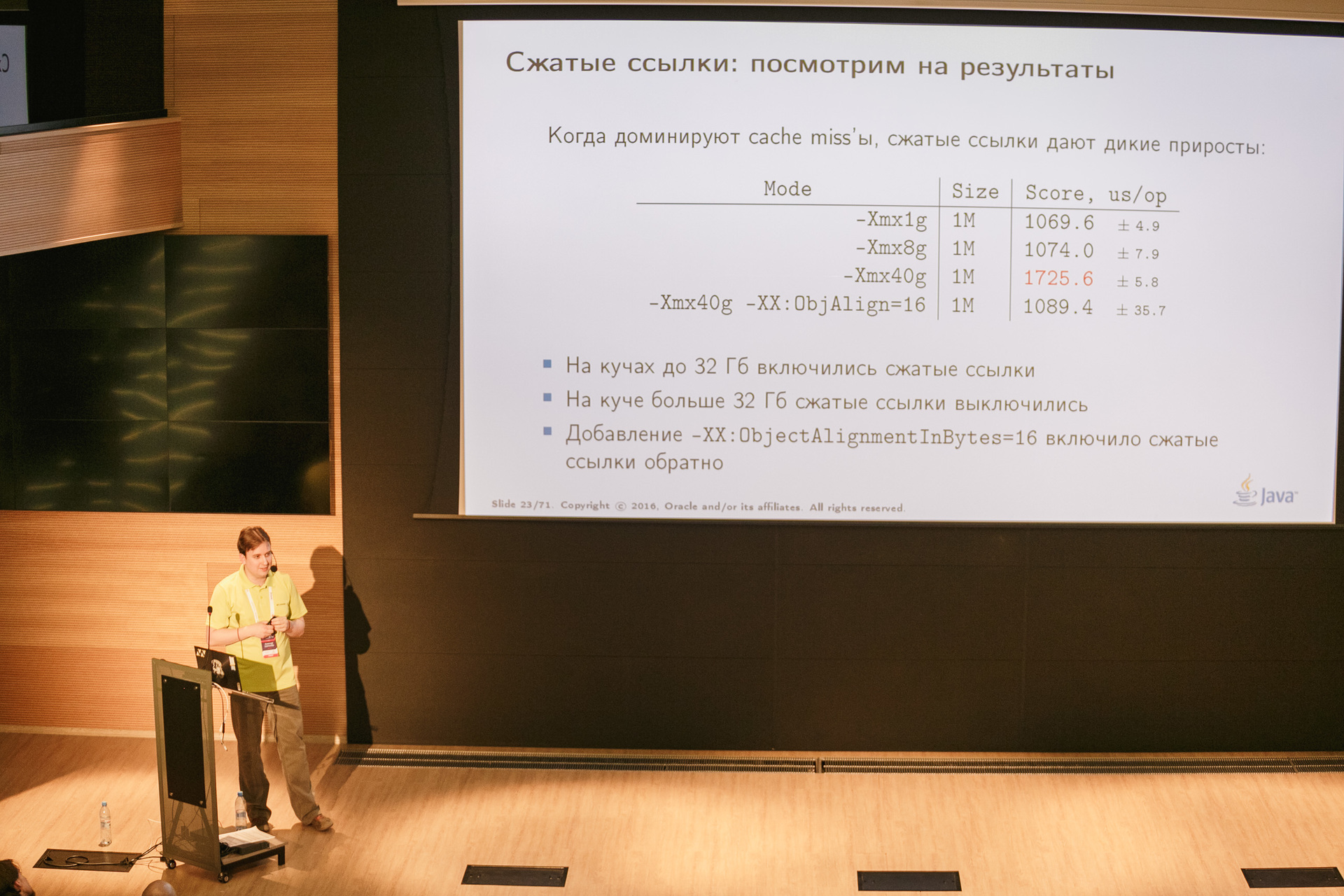
After that, there was another English-speaking report ( Volker Simonis (SAP) with the theme “HotSpot Intrinsics”), and then in the main hall, Alexey Shipilev closed the program with the theme “Squeeze me completely”. This report was already heard at JPoint 2015 , but for those present in the hall it was new, and it caused no less lively interest among those present than in Moscow. It seems that Shipilev could, like a rock star, arrange tours around the country: he has enough fans and charisma and hit reports for that.

In general, all three questions that initially arose received affirmative answers: audience interest was high, it was possible to call interesting speakers to Novosibirsk, and local specialists are able to come up with unique hardcore material. The performance of Roman Andreev and Sergey Andreyenko turned out to be so successful that they wondered at JUG.ru whether to include them in the JPoint or Joker program so that they could tell about Java on Elbrus and there.
During the closing ceremony of the conference, Aleksey 23derevo Fedorov noted: what happened on Technopark this day sold out means, firstly, that JBreak 2017 cannot be dispensed with in a year, and, secondly, that it will have to look for a bigger place for him: interest in technology region exceeded expectations.
At the Moscow JPoint, people from various cities, including Siberian ones, gather. Could it be with the development of JBreak so that Muscovites will start listening to his reports? :)
This decisive breakthrough raises many questions. Did you get the audience together? Did you manage to create an interesting program, or do not call anyone from bright speakers to Siberia? And the most curious thing: was there something at the Siberian conference that is not in Moscow and St. Petersburg?
All answers - in the detailed text under the cut.
')

In Novosibirsk, even the conference venue itself is reminiscent of information technologies: the event was held at the Technopark of the Novosibirsk Academgorodok. The building of two connected “towers”, which appeared in 2012, immediately became one of the most recognizable objects of the Academgorodok (perhaps even more recognizable than the monument “Mouse knitting DNA”) - therefore use conference rooms located in one of the towers , downright obvious.

However, already during the opening an important restriction of the site became noticeable. If we count both spectators, speakers, and organizers, the conference brought together 400 people - and rested against the ceiling of capacity. Any possible anxiety "but suddenly no one will come" turned out to be clearly in vain. On the badges of the participants it was possible to see the names of not only Novosibirsk companies (Excelsior, LEDAS), but also, for example, Tomsk Siberteam - so the conference was not limited to one city, but brought together experts from the entire region.

After the opening, the reports began in three halls. Vladimir Krasilshchik (Luxoft) was the first to take the main stage with a speech about useful conclusions made by him when changing the logging system in the project. Here I would like to recall that the popular old Habrapost about logging in Java is equipped with the subtitle "Nightmare Story": the zoo of the relevant products, allowing for the "wrapper around the wrapper" situation, cannot be dealt with. On the one hand, this means that such reports are useful (there are many nuances that you should pay attention to), but on the other hand, that the only correct approach to logging does not exist, and you have to choose which services to use exactly anyway. Dyer himself, answering the question “why did you choose SLF4J + logback,” simply demonstrated their logos: these two products were already developed with the idea that they would be used together.

In the third hall, in the meantime, a Luxoft employee also spoke, but from Poland - Michal Kordas . And after that, the second hall was taken by Aleksey Shipilev (Oracle) , who didn’t need any introduction to the Russian Java community. That is, the geographical location of the conference did not prevent to attract neither a foreign specialist, nor a star of Russian Java conferences.
Sberbank-Technologies for a long time occupied the third hall with a series of mini-reports on the new Sberbank platform. The very fact that a rather closed large organization suddenly decided to show “what is under the hood”, as one of its speakers commented, “we ourselves are in shock” is interesting here. It seems that times are changing: first, German Gref directly acknowledged the shortcomings of the current IT situation in Sberbank and linked his future with “technologies of a Russian-American company”, and now the bank has allocated an entire troop of speakers for a detailed story about this future. Separately, it is curious that this happened at the Novosibirsk conference, and Siberians received reports that Muscovites did not hear (in Moscow there was already a conference "Front Front System" , but with a completely different composition of speakers).

In the speeches of Sbertech, the company Gref referred to was repeatedly mentioned: this is GridGain, in which Sberbank recently acquired a share. She is engaged in the In-Memory Data Grid, and the bank decided to follow this path, keeping all possible data in RAM and using non-volatile data for archiving only. Sberbank is not the only bank that has taken such a course, but the largest one, and even basic numbers are impressive in its case (5 petabytes of archives, 500 million daily transactions - while transactions account for only 10% of system calls, most of the requests are informational) .

In the report on load testing, Sbertech speakers, illustrating their thesis “you should start it as soon as possible,” mentioned a touching detail: when working on a new Sberbank platform it was worth doing such testing, and there was not enough equipment for this , temporarily used computers of employees who went on vacation. The fact that they told this also shows that the bank was more open than one would expect - and as a result, the audience actively asked questions to the speakers even when the lunch time began. If people are ready to postpone food in order to find out something, this is probably the most graphic evidence that they found it interesting.
Immediately after lunch, it is difficult to dive into the technological jungle - so the presentation by Oleg Zolotye , Managing Director of Luxoft Russia , dedicated not to technical issues, but to the specifics of working in Luxoft, helped calmly digest both information and food. Meanwhile, in another room, Nikita Lipsky (Excelsior) , who has been working on Excelsior JET for many years, talked about how Java 8 features are implemented in it. Although Lipsky can be seen at Moscow and St. Petersburg conferences, he spoke here in his native land. Since Excelsior JET is used all over the world, it is easy to lose sight of the fact that this is a Novosibirsk project - but the report reminded you of this by putting the city on the map of the Java world.

But the most interesting of the local began after that. Novosibirsk Artemyev and Sergey Andreenko from UniPro at the Moscow conferences was not to be seen - and if JBreak had not passed in their city, who knows if they would have presented their work somewhere in public. At the same time, they have a unique experience in implementing Java on the Russian Elbrus processor (commissioned by the MCST: UniPro has many years of experience working with Sun, so it’s not surprising that they make Java for Elbrus).
It was obvious: what was told here, in Moscow, was not heard, and did not google on the Internet. As a result, in the third hall, not only were all the seats filled, but there were enough standing spectators, and everything was very lively: although questions are usually asked after the report, many here were not kept and asked right away.

Even before it turned out that something was said about Java, the conversation began with the details of the Elbrus architecture - so that low-level fans got on the move with their portion of hardcore. The speakers then proceeded to how architectural features affect the use of Java (“yes, exceptions should be thrown away less often”) and how they optimized, and at the end shared their results of comparing Java performance on Elbrus and on Intel Core 2 Quad Q9300. While Intel predictably turned out to be faster, in terms of “performance per gigahertz,” it turned out to be a parity that impressed even experts from Excelsior, Oracle and SAP, who were sitting in the hall. Not so long ago in the text on GeekTimes about the performance of Elbrus, the situation with Java turned out to be much sadder, that is, optimization right before our eyes brings great results.
When the report ended the same, the organizers immediately had to say “let's confine ourselves to a couple of questions, and the rest can be answered on the sidelines”: it was obvious that otherwise the time limit would not be met. As a result, Roman and Sergey moved to the hall, where they continued to speak enthusiastically with the people around them.

After that, there was another English-speaking report ( Volker Simonis (SAP) with the theme “HotSpot Intrinsics”), and then in the main hall, Alexey Shipilev closed the program with the theme “Squeeze me completely”. This report was already heard at JPoint 2015 , but for those present in the hall it was new, and it caused no less lively interest among those present than in Moscow. It seems that Shipilev could, like a rock star, arrange tours around the country: he has enough fans and charisma and hit reports for that.
In general, all three questions that initially arose received affirmative answers: audience interest was high, it was possible to call interesting speakers to Novosibirsk, and local specialists are able to come up with unique hardcore material. The performance of Roman Andreev and Sergey Andreyenko turned out to be so successful that they wondered at JUG.ru whether to include them in the JPoint or Joker program so that they could tell about Java on Elbrus and there.
During the closing ceremony of the conference, Aleksey 23derevo Fedorov noted: what happened on Technopark this day sold out means, firstly, that JBreak 2017 cannot be dispensed with in a year, and, secondly, that it will have to look for a bigger place for him: interest in technology region exceeded expectations.
At the Moscow JPoint, people from various cities, including Siberian ones, gather. Could it be with the development of JBreak so that Muscovites will start listening to his reports? :)
Source: https://habr.com/ru/post/280462/
All Articles